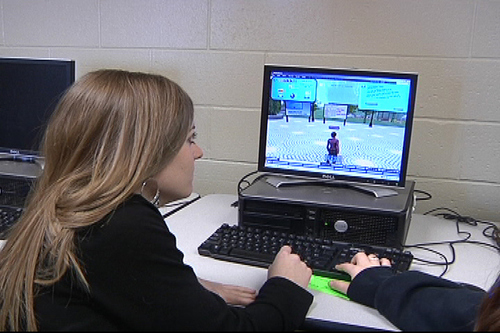A study from Brigham Young University (BYU) has revealed online role-playing games like World of Warcraft both negatively and positively impact marital satisfaction.The study looked at 349 heterosexual couples, dividing the respondents into two groups: one in which both spouses gamed, and the other in which only one spouse gamed.
For couples in which both spouses play, the study found 76 percent said that gaming had a positive effect on their marital relationship, particularly couples who interacted in-game.The average age of the respondents in the nationwide survey was 33 years, while the average marriage length was seven years. Of those couples in which only one spouse gamed, 84 percent were the husbands; of those couples where both gamed, 73 percent of those who gamed more were husbands.
Via au.gamespot.com
Those who play together, stay together – study
ClassRealm: How One Teacher Turned Sixth Grade Into An MMO
Video games and education. Two passions in my life that I tend to keep separate. I’ve been on the learning side of education for the last 16 years, but last fall I made the transition from student to teacher. I was dead set on bridging the gap between my life as a gamer and my life as a teacher before the school year even started. I plastered the walls of my classroom with posters of Link, set up Mario action figures across my desk and crafted 8-bit sprites all over my board. My sixth grade students loved that I was interested in video games — just like them! As sixth graders, most of the boys in my class were more focused on Call of Duty and Madden, they had no knowledge of the magic of platformers, RPGs, or adventures games.I wouldn’t be as well read as I am today if it wasn’t for video games.
As I was describing my video-game-related teachings to my buddy Courtny, we began talking about incorporating gaming into education. Why not? I probably wouldn’t be as well read as I am today if it wasn’t for games like Pokémon Red and Blue. Games that relied on text. How else would I have known a large Pokémon was blocking Route 12? Video games are surprisingly helpful in school. They often promote reading, help students think through problems, and give players a sense of accomplishment to strive for. Courtny and I weren’t the first to think of gamifying a classroom, but maybe we could come up with the best system to date.
Via www.kotaku.com.au
Students Enter Virtual World of Finance (Second Life)
Students at Maine Endwell High School have entered in to a virtual world in order to learn about financial planning for their future.
Visions Federal Credit Union provides this free educational tool.
Maine Endwell is the first school in New York State to use the game, Modoh Island.
“Our hope is that eventually it will be something that the teachers can use to supplement their classroom without our hands on in it,” says Colleen Barton, Youth Educator for Visions Federal Credit Union.
To play, students create an Avatar and start with $10,000 dollars.
They have to make choices from buying cars to paying school loans, and buying or renting a home.
“I just picked the basic schooling and I was just careful about the car, and I picked a smaller house, cheaper and cheaper car. Smart decisions for then and now I can get a nicer car and house,” says Julie, an 11th grade student.
Via www.wbng.com
EVE Online offers lessons for the financial crisis
Uh-oh! Another big bank is the subject of a depositor run amid charges its chairman has run off with customers’ money. Thankfully, this scandal is only taking place in Eve Online, a space-age virtual reality created by CCP, a games developer and Iceland’s coolest company. But Ebank’s troubles in the ether may offer some valuable lessons for earthly banking and regulation.
Eve is one of the more successful so-called massively multiplayer online games. Some 300,000 people – as it happens, nearly equal to the population of Iceland – pay $15 a month to navigate characters that pilot inter-galactic spaceships, manufacture and trade goods, mine resources and enter into big alliances – or bloody battles – with one another.
Central to Eve’s strategy, players develop economies within an “anything goes,” free markets framework that allows them to expand their fleets, buy weaponry and equipment and bolster defences. Indeed, Eve boasts 66 different marketplaces for some 5,000 items, with more than a million transactions a day.
Enter Ebank. Because players often do not have the interstellar credits – abbreviated to ISK, also the official abbreviation of the Icelandic krona – they need to expand their fleets, an enterprising player created a bank that would accept deposits and lend to players who would pledge assets, like their spacecraft, as collateral.
Via www.telegraph.co.uk
Ultima Returns as Browser-Based F2P MMO Strategy Game
Electronic Arts and Aeria Games have jointly announced the launch of Lord of Ultima, a new addition to the Ultima franchise that can be played within a browser.Following the successful launch of Battlefield Heroes and Need for Speed World, Lord of Ultima is the latest, and third, title Aeria Games has released from its multi-game deal for EA’s portfolio of Play4Free games.”Set in the legendary Ultima universe, the game transports players to the new world of Caledonia where players aim to grow their capital on the path to glory,” reads the description. “By exploring new continents and forging a vast empire, players will master the art of diplomacy and trade as well as the military activities of spying, plundering, and conquering enemy cities. Players can mark their place in history by attaining the mighty and feared status as Lord of Ultima.”
Via www.tomshardware.com
Ball State University buys out Blue Mars platform
 It’s fair to say Blue Mars has had some challenges over the years, but it looks like it’s about to go to an even safer pay of hands, with Ball State University buying the platform:
It’s fair to say Blue Mars has had some challenges over the years, but it looks like it’s about to go to an even safer pay of hands, with Ball State University buying the platform:
Under Ball State’s terms of agreement with Avatar Reality, the university will begin to fully operate Blue Mars for non-commercial purposes, expand upon the source code, increase its research and academic initiatives, and enhance the community of Blue Mars. In addition, Ball State will continue to deliver original content on Blue Mars as it has done in the past. “I am really excited about the future,” Phil Repp, Ball State’s vice president for information technology, said. “Through our division of Hybrid Design Technologies, Ball State will further our position as a national leader in hybrid worlds and their applications to mediated learning technologies. Our reputation in this discipline is such a perfect fit to our institutional history of innovation in teaching and learning.
Read the rest at over at the superb dwellonit.taterunino.net
Linden Lab acquires experimental game studio LittleTextPeople
 Spotted this little snippet on Gamasutra:
Spotted this little snippet on Gamasutra:
Second Life developer Linden Lab has acquired the experimental game studio LittleTextPeople, which specializes in exploring the emotional possibilities of interactive fiction.This marks the first acquisition for Linden Lab since former Sims developer Rod Humble took over as CEO in 2010, and falls in line with the comapny’s new strategy to experiment with game design and develop products beyond Second Life. LittleTextPeople, founded by writer Emily Short and Maxis veteran Richard Evans, has so far focused on the development of software that replicates complex social interaction. For instance, among its internal technology is a simulator that models social behavior and individual personalities.
The article goes on to talk about it’s great use in interactive novels. I can see a lot more usefulness beyond that – particularly in the education and simulation sphere. I doubt that’s the direction LL will take it however. You can also view the full press release here.
The pic on this post is from Botgirl Questi’s blog – check the brilliant pic out in full there.
Aussie R18+ legislation aiming for Jan. 2013 introduction
Australian gamers can expect to have an R18+ classification for games by January 1, 2013, according to the federal government.Federal Minister for Home Affairs Jason Clare today introduced the R18+ bill in parliament and announced the federal government expects the R18+ for games legislation to officially come into effect next year.Last month, Clare announced his intention to stick to former Federal Minister for Home Affairs Brendan O’Connor’s previous plans in introducing the R18+ legislation in the February 2012 session of parliament.Clare has stayed true to this plan, officially introducing the R18+ for games bill in parliament today.
Via au.gamespot.com
Credit card thieves target OpenSim grids

Credit card thieves have figured out a way to steal money from OpenSim grid owners.
They take the credit cards, and use them to purchase virtual currency from the grids. Then they turn around and redeem the currency for cash before the card holder notices the theft and complains. The credit card company reverses the transaction and now the grid is out the full amount — plus the time spent dealing with the issue.
Any grid that issues its own virtual currency and allows it to be redeemed is potentially vulnerable. Second Life, for example, to combat against this kind of fraud, has a security API in place for third-parties that trade its currency, such as outside currency exchanges, as well as internal controls.
Via www.hypergridbusiness.com
28 Australian Tertiary Institutions in Joint Paper on Second Life
 Virtual Worlds Working Group, albeit a very inactive one at present – if you’re interested in getting involved drop them a line.
Virtual Worlds Working Group, albeit a very inactive one at present – if you’re interested in getting involved drop them a line.
- « Previous Page
- 1
- …
- 4
- 5
- 6
- 7
- 8
- …
- 165
- Next Page »






Recent Comments